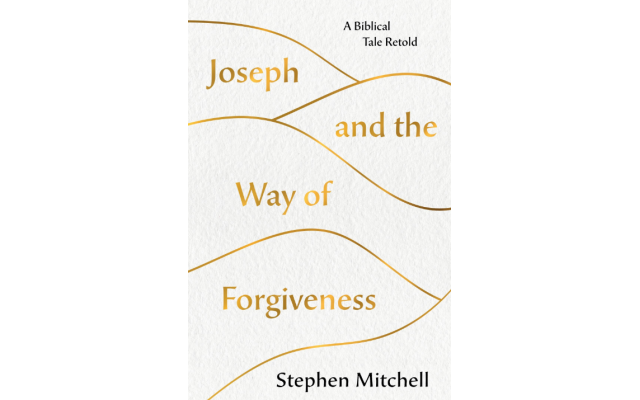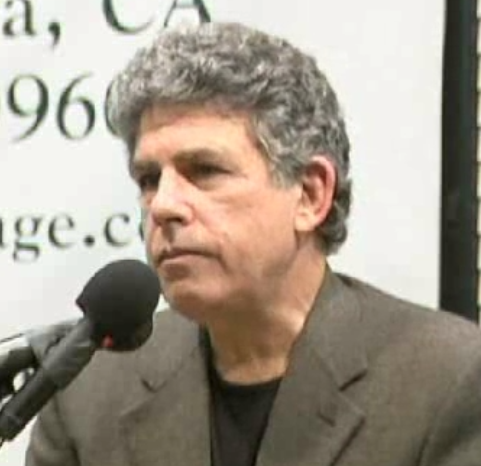Forgiveness Drives New Book About Biblical Joseph
Stephen Mitchell’s new book, “Joseph and The Way of Forgiveness: A Biblical Tale Retold” retells the Joseph story, with an emphasis on the “all embracing forgiveness at its core.”

Whether by design or coincidence, Stephen Mitchell’s new book, “Joseph and The Way of Forgiveness: A Biblical Tale Retold” arrives as an extraordinary high holidays gift. The book, which was released Sept. 17, is an expansive retelling of the Joseph story, with an emphasis on what Mitchell describes as the “all embracing forgiveness at its core.”
Mitchell, who has written a number of critically acclaimed books derived from the classics of world religion, is inspired not just by the words and ideas of the Torah, but by the rabbinic tradition of midrash, which creatively transforms the biblical narrative. He wants us to understand the process of change that changes Joseph from a spoiled teenager into what becomes, in his opinion, the most spiritually mature character of the Hebrew Bible.
As a sample of how he embellishes and expands the narrative is his description of Joseph’s beautiful coat. It is an expensive gift from his father that seals his status as his father Jacob’s number one son. In the Bible it is described merely as having many colors. For Mitchell it is much more:
“…the ends of its sleeves were threaded with gold and silver, and on its front was embroidered a scene of the earthly paradise: at the top shone the sun, moon, and stars, and underneath them was a garden of brilliant flowers, in the middle of which, on either side of the Tree of Life, two curlicue-bearded angels, with large furled eagle’s wings, stood facing each other.”
The book, however, is concerned with more than just surface appearances. What sets it apart from other modern popularizations of the Joseph story, such as the highly successful film and Broadway musical, is how it deals with Joseph’s faith and how that transforms his relationship with his brothers.

In a fit of jealousy, they kidnap him and consign their young sibling to what they hope will be a life of slavery and abuse in Egypt. Yet Joseph realizes early on that the key to his survival is to merely trust in G-d and what he has planned for him.
At its heart, Mitchell’s book is a story of Joseph’s insight that all that happens to him, including the brutal treatment he receives from his brothers, is just part of a divine mission that he is to fulfill.
“Ultimately, it wasn’t they who had thrown him into the pit: it was G-d. It wasn’t they who had sold him into Egypt: it was G-d. G-d was the only creator in this whole drama; they were simply His instruments, His actors. Their crime had been for the good of them all, though that hadn’t been their intention.”
Mitchell’s inspiring high holidays message of forgiveness is grounded in Joseph’s deep belief in G-d.
In often profound terms, he reanimates this ancient character. He springs to life, full of forgiveness and understanding when he comes to believe that G-d is the only force in life that matters.
“Everything happens according to G-d’s will; everything that happens, whether apparently good or apparently bad, is meant to happen, precisely because it did happen; though the future has infinite possibilities, the past has only one. “
Ultimately, Joseph overcomes his life of slavery and imprisonment in Egypt to become the Pharoah’s right hand man, the second most powerful figure in a nation that was a leading force in the known world of 3,700 years ago. His rise to temporal power only magnifies and illuminates the spiritual power that is such an important part of this book.
“Joseph understood how painful it is to live in a mental world of good and evil, in which people consciously choose to think the thoughts that come into their minds and then consciously choose to believe those thoughts: a world in which G-d rewards and punishes people for actions that in reality they couldn’t help, because those actions were the direct effects of those beliefs.”
Mitchell’s book has been welcomed with a veritable avalanche of praise and appreciation from Jew and gentile alike. It is a long, cool drink of understanding in a fractious and overheated contemporary world of ill will and retribution.



comments